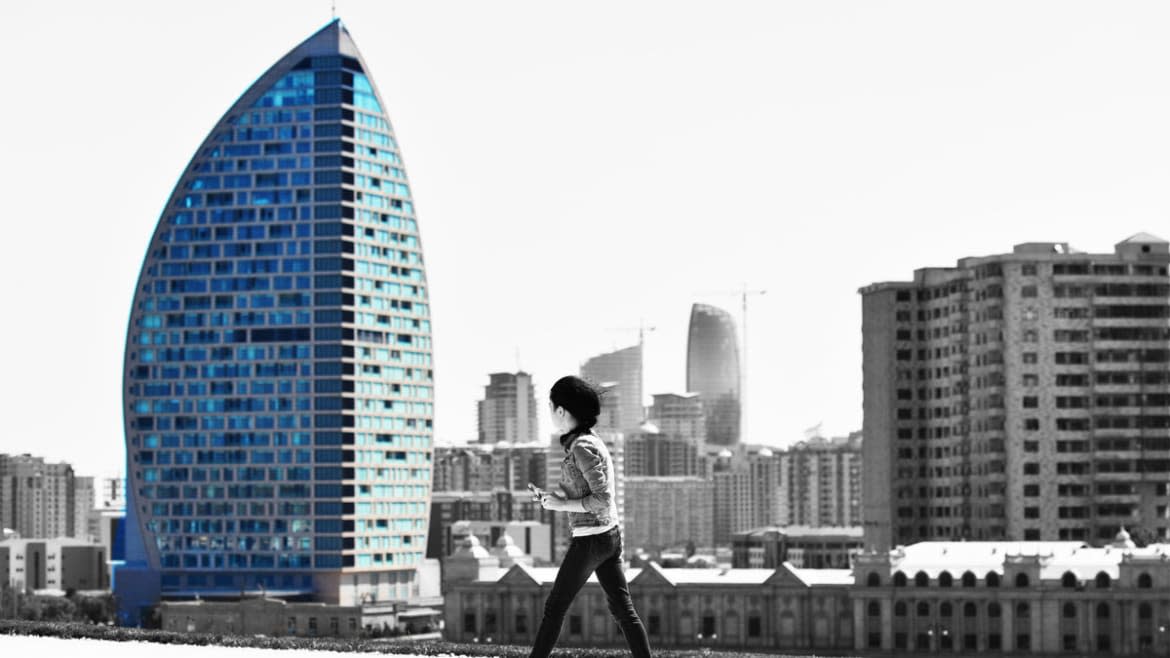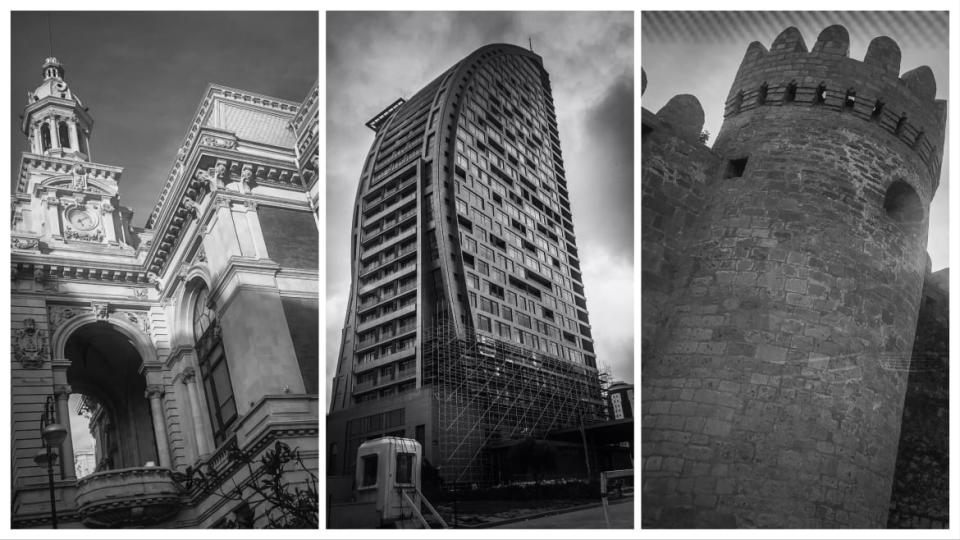In Baku, the Trump Tower Dares Not Bear His Name

BAKU, Azerbaijan—From the 21st floor of the Landmark Hotel, we look down at an ancient city of sandstone. It seems to lie beneath us as soft and delicate as an Azerbaijani carpet, full of contrasting colors blended into surprising harmony.
At its best, this is a country where, for much of its history, Sunni and Shia Muslims, Jews and Christians have lived side by side, and the capital of Baku, which means “the city of wind,” has a very particular history. For millennia it was a crossroads, but then it was blessed (and in some ways cursed) with vast petroleum wealth in the 19th century. The first oil wells in the world were drilled here in the 1840s—eventually providing 95 percent of the Russian empire’s oil, and half of the global supply.
The Surreal Architecture Porn of Baku, Azerbaijan
By 1900, Baku’s oilmen were among the richest people on Earth. This was a boomtown built on black gold, a “cosmopolitan Klondike,” and a jewel of the Belle Epoque, even though, as one visitor put it back then, “You can feel the oil and inhale the fumes. You walk among clouds of smoke which cover up the sky.”
Then came World War I, the Bolshevik Revolution, and the Soviet Union, and it was only after the collapse of the Russian-Soviet empire in the 1990s that this country and this city really began to rouse itself once again. In recent years, American, European, Chinese, Russian and Arab businessmen, including Donald J. Trump and his family, have tried to make money in what is once again a very vibrant city.
As we looked out from the top of the hotel, a powerful southwest wind danced waves across the Caspian Sea and brushed over the roofs of Baku, where each district represents a layer of Azerbaijan’s history.

At the city’s core is a fortress built before the Russian Empire. The ancient walls enclose the old town called Icherisheher. But there are also drab Stalin-era apartment blocks on the skyline and glossy post-Soviet highrises, including a curvy edifice that was once going to be a Trump International Hotel—yet another “Trump Tower”—but now sits empty, locked up, unnamed, and politically unmentionable.
As president, Donald Trump claims he’s dedicated to rooting out corruption in former Soviet republics, which is what he insisted he was doing when he strong-armed Ukraine’s president last year in an effort to dig up dirt on his rival Joe Biden, the alleged abuse of power for which Trump subsequently was impeached though not convicted.
At a minimum, the tower here suggests precisely why Trump might feel he is familiar with the back-scratching corruption in this part of the world, and his expectation that those who take part will keep quiet about it.
Azerbaijan, even by the standards of the former Soviet Union, lives in a deep shadow of overlapping money and power at the top of the government. When Trump came on the scene early in the last decade, before his presidential bid, it seems he had no problems getting the tower built, thanks to a partnership with the family of a former minister.
As Trump’s candidacy gathered momentum in 2015, so did scrutiny of his Baku deal by The Washington Post, the Associate Press, Mother Jones, and other publications. The optics were not good at all. Ivanka Trump had taken a high-profile role in the massive branding exercise associated with the project. Then came a long investigative report in The New Yorker, a few weeks after Trump’s inauguration. Among its revelations, the president “helped build a hotel in Azerbaijan that appears to be a corrupt operation engineered by oligarchs tied to Iran’s Revolutionary Guard.”
This should not have come as an enormous surprise, given that U.S. embassy cables about the deal had been available through Wikileaks for four years, but the Trump Organization claimed there was no way it could have known how shady its partners really were.
An old-time expat here, British investor John Peterson, has been observing Baku’s “Dubai-style development” over the past two decades with great interest. “I have seen all of these towers grow from the ground up, like children,” Patterson said pointing at glossy luxurious hotels, business centers and apartment blocks with residences worth up to $2 million. “There it is—the 'Trump Tower,'” Patterson waved at the chubby, structure which, depending on one's mood, looks like it might be meant to suggest a sail, or a pot belly. What it certainly is, is a white elephant.
Baku’s latest construction boom started in 2004-2005, when Azerbaijan was selling up to one million barrels of oil every day. Those were golden years. The price for a barrel of crude ran up to $146, but today as Russia and Saudi Arabia are engaged in a price war amid a global economic slowdown brought on by the coronavirus pandemic, prices are closer to $30 a barrel or below, so not as many people can afford the luxurious residences that Ivanka came here to hawk on a visit in 2014.
The tower stands on the edge of a busy highway, far from the nearest pedestrian crossings. When we went to check it out more closely, two security guards were smoking at the gate. No entry. No explanation.
As it happened, that was also the day of the parliamentary elections, when Azerbaijani citizens voted for more than 1,000 registered candidates, an exercise in the perpetuation of rule of a single family.
Azerbaijan is deeply focused on its own local issues—and on the Aliyev—clan. Few people care to ask embarrassing questions, and nobody seems surprised that the immense expensive building formerly named Trump has remained empty in the center of the capital for five years. It's just part of the background. And it's not the only tower waiting for investors.
“If you did not ask me, I would not have thought of the Trump Tower’s whereabouts, even though it is actually close to where I live.” The head of Azerbaijan’s Public Television and Radio Broadcasting company, Balakishi Qasimov, shrugged his shoulders. Who owned the building before the U.S. presidential elections of 2016? Who owns it now? “It has never been the key issue, our [TV] channel has never reported the story on why that tower is still empty, I am not sure what the official version is, why it is no longer the Trump Tower,” Qasimov added.
The city of Baku knows how to hide millions of secrets, millions of whispers, how to offer Azerbaijani tea served in a traditional Armudu glass while keeping the gate between Europe, Asia and Middle East safe.
At a time of ice cold relations between Russia and NATO, Baku recently welcomed high-level security negotiations.
Two important commanders, Russia’s Chief of the General Staff Gen. Valery Gerasimov and U.S. Air Force Gen. Tod Daniel Wolters, NATO’s supreme commander in Europe, met here in February. They discussed how to avoid military clashes in the air over Afghanistan and Syria. It was their second meeting in Baku in four months.
Azerbaijani opposition and human rights defenders are bitter about the fact that foreign diplomats rarely criticize arrests of opposition activists here while President Ilham Aliyev constantly asserts that Azerbaijan is an independent country with its own rules, meaning his own rules. And he also knows how to play the Trump version of geopolitics.
So, Azerbaijan is an American ally, he suggested, then added, as if de rigueur, "It is hard to turn Azerbaijan into an enemy. Only Armenia managed to do that by occupying nearly 20 percent of our territory.”
All Azerbaijani people, apparently without exception, feel the same about the conflict with Armenia in the region of Nagorno-Karabakh, one of those wars most of the world has forgotten. It killed more than 20,000 people in the early 1990s, created more than a million refugees, and still is not over. It is this country’s open and bleeding wound.
There are dozens of British companies operating in Azerbaijan, up to 4,000 British citizens live here. When President Aliyev said at the state university recently that Azerbaijan could do without the European Union, Patterson was not surprised—in the post-Brexit era that may make sense. (And since our visit to Baku, the coronavirus crisis has done even more to shatter European unity.)
“Britain is the number one foreign investor in Azerbaijan," said Patterson. "BP is the largest foreign company based here, so I see why they say they don’t need Europe. They manage their situation really well: there are not many states that are friendly with Iran and Israel, Washington and Moscow, Beijing and Istanbul.”
A generation of Azerbaijanis grew up under Aliyev rule, as Ilham succeeded his father, Heydar Aliyev in 2003, who had been president since 1993, and before that first deputy premier of th Soviet Union as well as first secretary of the Commmunist Party of Azerbaijan dating back to 1969.
When dozens of younger politicians, including up to 100 opposition candidates and outspoken government critics, were registered for parliamentary elections earlier this year, Western experts welcomed Aliyev’s efforts to replace Soviet bureaucrats with new faces.
“In general, we see a positive development, even if it is a show, it shakes things up, brings a bit of light into this authoritarian country,” said Thomas de Waal of the Carnegie Endowment for International Peace.
Moscow political strategist Sergey Markov also worked on the pro-Kremlin projects in Baku during the elections. “It’s obvious that Aliyevs try to invest the oil money into the country’s development and take the economy out of the shadows,” Markov told The Daily Beast. “This is a uniquely moderate Muslim country, where the first lady and her daughter deliberately wear mini- skirts and v-neck dresses to set an example for secular society.”
More than 800 international observers were on hand during the elections—and the report released by the Organization for Security and Cooperation in Europe, OSCE, was full of negative comments: “Voters were not provided with a meaningful choice, due to a lack of real political discussion,” it said.
Get our top stories in your inbox every day. Sign up now!
Daily Beast Membership: Beast Inside goes deeper on the stories that matter to you. Learn more.

